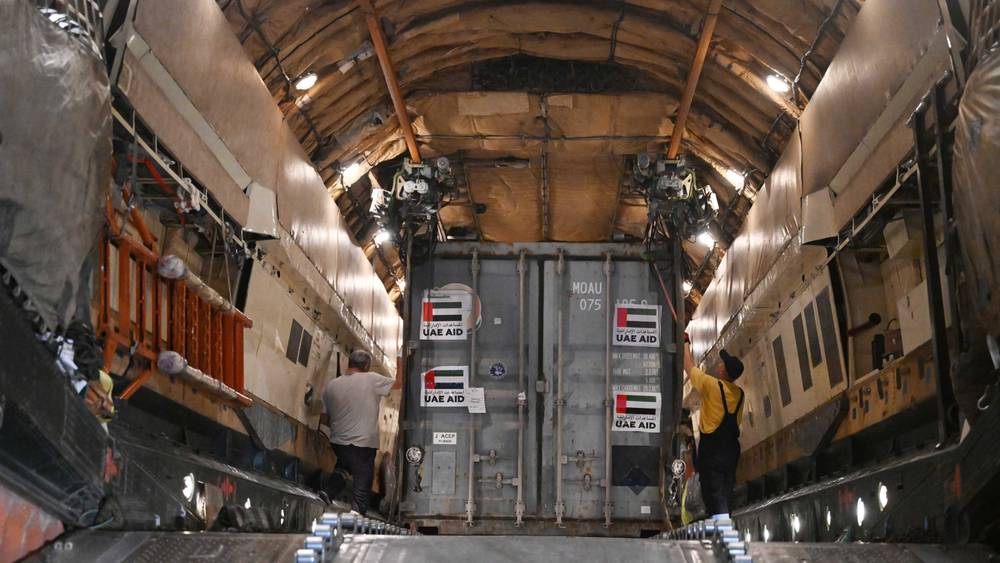
Sudan: Two Ministries Accused of Manipulating Aid to Darfur
Abdulrahman Al-Ajeb
Amid the ongoing war in Sudan, the issue of aid manipulation has recently come to the forefront, particularly in the distribution of relief materials intended for the troubled regions. Reports have revealed irregularities in aid destined for Darfur. So far, accusations of corruption and suspicions have been directed at the Ministries of Finance and Social Development, in addition to the Darfur regional government.
According to reports, relief materials from the United Arab Emirates destined for Darfur were shipped from the Port Sudan in the east of the country to Kosti in the south on June 25th of the past year. Upon arrival in Kosti on June 27th, the shipments trucks were replaced.
Well-informed sources have confirmed that when the trucks departed from Port Sudan, there were 13 trucks carrying relief materials estimated at 350 tons. The relief items included crates, with each crate weighing 25 kilograms, consisting of sugar, oil, rice, milk, tomato paste, beans, lentils, salt, tuna, pasta, and wheat flour.
Between Port Sudan and Kosti, four of the 13 trucks went missing. It is reported that one truck was seized in the city of Wad Medani, and the cargo of another truck was divided among the remaining trucks, while two trucks disappeared under unknown circumstances.
As a result of these losses, the trucks cargo was reduced from 350 tons to just 294 tons.
According to a well-informed source, the Minister of Finance and Economic Planning, Gabriel Ibrahim, authorized a payment of 650 million Sudanese pounds for the transportation of relief from Port Sudan to various cities in Darfur. In the context of the funds allocated for relief transportation, the source indicated that the amount was transferred to the account of a senior official in the Ministry of Social Welfare.
According to experts, this step violates financial and accounting laws, regulations, and procedures, as these funds are government funds and were transferred to a personal account.
The task of transportation was assigned to another individual who lacked the financial capability, administrative competence, and experience in this field. It was later revealed that this individual was an employee of the Ministry of Social Welfare, and he, in turn, assigned the shipment of relief from Kosti to Darfur to a well-known middleman in Kosti. This middleman redirected the funds meant for relief transportation to another purpose, specifically, the transportation of agricultural seeds provided by the American Aid for the United Nations Food and Agriculture Organization, intended for additional profit.
According to reports, the last middleman received 58 million Sudanese pounds and disappeared to an unknown location. Meanwhile, the government employee received a portion of the relief transportation funds, while the senior official at the Ministry of Social Welfare received a larger share of the money and traveled to Russia.
Despite the authorization of 650 million Sudanese pounds for transportation, the UAE relief for Darfur remained unloaded on the trucks, exposed to the harsh sun, rain showers, and humidity for an extended period, lasting over two months, and a significant portion of it is likely to have been damaged.
On the other hand, citizens have reported the leakage of significant and diverse quantities of relief materials donated by friendly countries to Sudanese people affected by the war. These relief items have made their way to markets in Port Sudan, Kosti, Medani, and El Obeid and have been sold there. Many affected citizens have confirmed that they have not received any relief materials, neither in Khartoum nor in the war-affected states.
For some observers, this represents a major ethical failure, as these relief items were donated by friendly countries to save the lives of some citizens affected by the war. Additionally, budgetary allocations from the Sudanese peoples funds were made for their transportation to the affected areas.
For some, the significant ethical failure lies in the fact that some ministers and officials, who belong to the same suffering and hungry population, have resorted to seizing aid and funds intended for transportation.

